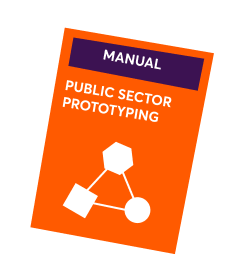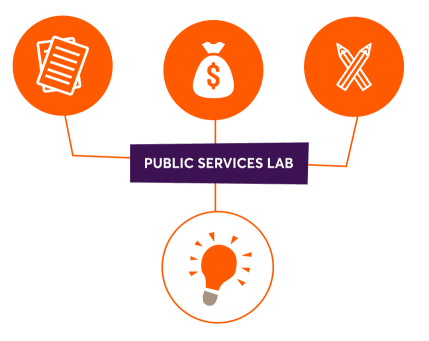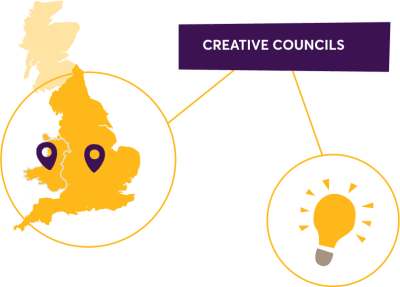By making smarter use of data and technology, engaging citizen skills and equipping public servants with innovative tools, we can create world-leading public services and thriving communities.
2010
-
The first public sector prototyping manual
In partnership with ThinkPublic, Nesta produces a manual that provides a framework for public servants to take the design, test and iterate concepts from commercial design to apply them to new public services design.
-
Public Services Lab is established
Nesta creates an internal lab with a mix of former public servants, grant makers and designers, who focus on finding new solutions to public services challenges.
2012
-
Creative Councils launches
Our Creative Councils programme launches to help local government innovators across England and Wales develop radical new solutions to some of the biggest challenges facing their communities.IMPACT
The Creative Councils programme is heralded as a game-changing new way of councils leading change.
2013
-
The Centre for Social Action is created
The Centre is created as a £25million partnership with the Cabinet Office over seven years, to grow the impact and reach of 100 people-powered public services innovations, inside and outside of government.IMPACT
Through 150 innovations, more than 1 million beneficiaries are supported by 100,000 volunteers (peers in support groups, mentors, first aiders and more) who give their time alongside public servants.
2014
-
Nesta Challenges is established
Nesta Challenges exists to design and run challenge prizes that help solve pressing problems that lack solutions. It launches the first prizes from government since ship navigation in the 1600s.IMPACT
One example sees 80 teams around the world race to win an £8million prize for the first invention of an affordable, accurate, fast and easy-to-use test for bacterial infections to fight anti-microbial resistance.
-
The Behavioral Insights Team spins out of government
The Behavioral Insights Team use the very best of behavioural insights – from academia and practical examples – to explore issues, develop solutions to address challenges, and rigorously test what works. Nesta provides an investment to set up BIT independently from government, owning a third of the company.IMPACT
400 randomised control trials later, the spin out ensures many more governments around the world have access to skills and methods that work.
2015
-
Y Lab is created
Y Lab is a £4million partnership with Cardiff University to support public services in Wales to innovate.IMPACT
Y Lab issues the first public sector repayable finance loans that combine grants, support and loan funding to support innovations. £3million loans are issued with £10million projected to be saved by the public purse.
-
Innovation Growth Lab is created
€150 billion is spent every year on innovation, entrepreneurship and business growth support programmes in Europe alone. Yet, there is little credible evidence on what works, and what doesn't. Innovation Growth Lab (IGL) makes use of Random Control Trials (RCTs) to improve the design of the programmes and institutions.IMPACT
IGL starts running RCTs for policy inside of government.
2016
-
First Office of Data Analytics opens in London
Inspired by Nesta's vision for better decision-making with local data, the Greater London Authority establishes the first pilot Office of Data Analytics in the UK. Together, we develop a machine-learning model to help building inspectors identify unlicensed houses in multiple occupation (HMOs) properties that are often linked to dangerous and exploitative living conditions and which remain largely unknown to local councils.IMPACT
12 Offices of Data Analytics are established in local councils around England, and many more are being considered by other cities and regions.
-
Alliance for Useful Evidence is created
The Alliance for Useful Evidence promotes evidence-based policy making in response to billions spent on programmes with little evidence of what works.IMPACT
3000 public sector workers sign up as members.
2017
-
DECODE experiments in digital democracy begin
Nesta and its partners begin experiments with digital democracy, building and trailing tools that put individuals in control of whether they keep their personal data private or share it for the public good.IMPACT
The model is used in nearly 100 cities.
-
Term 'anticipatory regulation' coined
Traditional ways of regulating are struggling to cope with the pace of change in technology. Anticipatory regulation is an emerging approach that is proactive, iterative and responds to evolving markets like finance, drones and autonomous vehicles.IMPACT
Nesta supports trials, sandboxes and experiments with more than £20million to test new ideas in new regulatory frameworks. Flying High is a trial which demonstrates that drones can be used safely in cities and can save the public sector £1billion.
2018
-
The Centre for Collective Intelligence Design is established
Collective intelligence combines insights from crowds of people with the best of digital technologies like artificial intelligence and big data. Nesta's Centre uses collective intelligence to develop innovative solutions to social challenges.IMPACT
Collective intelligence design is adopted as an innovation method by UNDP teams in 60 countries to make faster progress on the Sustainable Development Goals.
2019
-
States of Change spins out of Nesta
Nesta established States of Change, an international training course and network for public sector innovators, with faculty experts from across the world.IMPACT
200 senior civil servants undertake the nine month course.
-
Nesta launches 20 Tools for Innovating in Government
Drawing on our work over a decade, Nesta launches a handbook detailing 20 tools that are proven to help innovation flourish inside of government.














